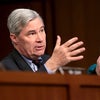The Senate on Tuesday approved a proposal to make daylight saving time permanent, which if passed in the House and signed by President BidenJoe BidenSaudi Arabia invites China’s Xi to visit Riyadh: report Biden attends in-person DNC fundraiser to tout climate agenda Man charged with attempted murder, hate crimes after NY Asian woman punched 125 times MOREwould mean Americans would never again have to set their clocks back an hour and lose an hour of afternoon daylight in the fall and winter.
If enacted into law, it would also mean that early risers lose an hour of daylight in the mornings in November, December, January and February.
In New York, for example, under current law the sun will rise at 7:15 am on Dec. 21, the shortest day of the year. If the Sunshine Protection Act becomes law, New Yorkers won’t see the sun rise until 8:15 am that day.
On the other hand, instead of the sun setting at 4:31 pm in late December, it will set at 5:31 pm — giving people a little more daylight to enjoy in the afternoon.
Sen. blond frame
“There’s strong science behind it that is now showing and making people aware of the harm that clock switching has, there’s an increase in heart attacks, car accidents and pedestrian accidents,” he said on the Senate floor.
“The benefits of daylight saving time have been accounted for in the research: Reduced crime as there is light later in the day, decrease in seasonal depression that many feel during standard time and the practical one,” he added.
Rubio said it would also give school kids more time to play in the daylight after school.
“In a country we desperately want our kids outside, playing, doing sports, not just to sit in front of a TV playing video games all day. It gets tough in many parts of the country to be able to do that. What ends up happening is for the 16 weeks of the year, if you don’t have a park or outdoor facility with lights, you’re basically shut down at 5 pm, in some cases 4 pm,” he said.
Rubio urged the House to quickly take up the measure and pass it.
He also noted that it would not take effect until next year.
“I think it is important to delay it until Nov. 20, 2023, because airlines and other transportation have built out a schedule and they asked for a few months to make the adjustment,” he said.
Sen. Sheldon Whitehouse
“Pretty much everybody in Rhode Island experiences the same thing on that unhappy day in early November … when suddenly an hour of your day, an hour of your daylight disappears and dusk comes an hour earlier,” he said.
“It does darken our lives in a very literal sense and by the time you get from November when we fall back to the shortest day of the year in December, the 21st I think it is, we have sunset in Rhode Island at 4:15 ,” I added. “That means everybody is driving home if they work regular nine-to-five hours they’re driving home in the pitch dark.
“So let’s make it 5:15,” he said. “Granted, there are people who are up between 6:30 and 7:30 in the morning who will then miss their hour of daylight but there are a lot fewer people up and about between 6:30 and 7:30 in the morning than there are between 4:15 and 5:15 in the afternoon.”
thehill.com
George is Digismak’s reported cum editor with 13 years of experience in Journalism